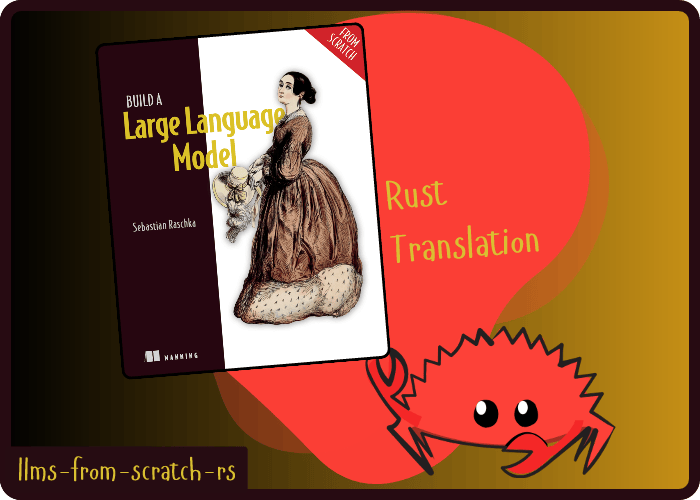10 releases
| 0.1.4 | Feb 27, 2025 |
|---|---|
| 0.1.3 | Jan 23, 2025 |
| 0.1.0-a4 | Dec 30, 2024 |
#254 in Machine learning
540KB
11K
SLoC
LLMs from scratch - Rust

This project aims to provide Rust code that follows the incredible text, Build An LLM From Scratch by Sebastian Raschka. The book provides arguably the most clearest step by step walkthrough for building a GPT-style LLM. Listed below are the titles for each of the 7 Chapters of the book.
- Understanding large language models
- Working with text data
- Coding attention mechanisms
- Implementing a GPT model from scratch to generate text
- Pretraining an unlabeled data
- Fine-tuning for classification
- Fine-tuning to follow instructions
The code (see associated github repo) provided in the book is all written in PyTorch (understandably so). In this project, we translate all of the PyTorch code into Rust code by using the Candle crate, which is a minimalist ML Framework.
Usage
The recommended way of using this project is by cloning this repo and using Cargo to run the examples and exercises.
# SSH
git clone git@github.com:nerdai/llms-from-scratch-rs.git
# HTTPS
git clone https://github.com/nerdai/llms-from-scratch-rs.git
It is important to note that we use the same datasets that is used by Sebastian
in his book. Use the command below to download the data in a subfolder called
data/ which will eventually be used by the examples and exercises of the book.
mkdir -p 'data/'
wget 'https://raw.githubusercontent.com/rabst/LLMs-from-scratch/main/ch02/01_main-chapter-code/the-verdict.txt' -O 'data/the-verdict.txt'
Navigating the code
Users have the option of reading the code via their chosen IDE and the cloned repo, or by using the project's docs.
NOTE: The import style used in all of the examples and exercises modules are
not by convention. Specifically, relevant imports are made under the main() method
of every Example and Exercise implementation. This is done for educational
purposes to assist the reader of the book in knowing precisely what imports are
needed for the example/exercise at hand.
Running Examples and Exercises
After cloning the repo, you can cd to the project's root directory and execute
the main binary.
# Run code for Example 05.07
cargo run example 05.07
# Run code for Exercise 5.5
cargo run exercise 5.5
If using a cuda-enabled device, you turn on the cuda feature via the --features cuda
flag:
# Run code for Example 05.07
cargo run --features cuda example 05.07
# Run code for Exercise 5.5
cargo run --features cuda exercise 5.5
Listing Examples
To list the Examples, use the following command:
cargo run list --examples
A snippet of the output is pasted below.
EXAMPLES:
+-------+----------------------------------------------------------------------+
| Id | Description |
+==============================================================================+
| 02.01 | Example usage of `listings::ch02::sample_read_text` |
|-------+----------------------------------------------------------------------|
| 02.02 | Use candle to generate an Embedding Layer. |
|-------+----------------------------------------------------------------------|
| 02.03 | Create absolute postiional embeddings. |
|-------+----------------------------------------------------------------------|
| 03.01 | Computing attention scores as a dot product. |
...
|-------+----------------------------------------------------------------------|
| 06.13 | Example usage of `train_classifier_simple` and `plot_values` |
| | function. |
|-------+----------------------------------------------------------------------|
| 06.14 | Loading fine-tuned model and calculate performance on whole train, |
| | val and test sets. |
|-------+----------------------------------------------------------------------|
| 06.15 | Example usage of `classify_review`. |
+-------+----------------------------------------------------------------------+
Listing Exercises
One can similarly list the Exercises using:
cargo run list --exercises
# first few lines of output
EXERCISES:
+-----+------------------------------------------------------------------------+
| Id | Statement |
+==============================================================================+
| 2.1 | Byte pair encoding of unknown words |
| | |
| | Try the BPE tokenizer from the tiktoken library on the unknown words |
| | 'Akwirw ier' and print the individual token IDs. Then, call the decode |
| | function on each of the resulting integers in this list to reproduce |
| | the mapping shown in figure 2.11. Lastly, call the decode method on |
| | the token IDs to check whether it can reconstruct the original input, |
| | 'Akwirw ier.' |
|-----+------------------------------------------------------------------------|
| 2.2 | Data loaders with different strides and context sizes |
| | |
| | To develop more intuition for how the data loader works, try to run it |
| | with different settings such as `max_length=2` and `stride=2`, and |
| | `max_length=8` and `stride=2`. |
|-----+------------------------------------------------------------------------|
...
|-----+------------------------------------------------------------------------|
| 6.2 | Fine-tuning the whole model |
| | |
| | Instead of fine-tuning just the final transformer block, fine-tune the |
| | entire model and assess the effect on predictive performance. |
|-----+------------------------------------------------------------------------|
| 6.3 | Fine-tuning the first vs. last token |
| | |
| | Try fine-tuning the first output token. Notice the changes in |
| | predictive performance compared to fine-tuning the last output token. |
+-----+------------------------------------------------------------------------+
[Alternative Usage] Installing from crates.io
Alternatively, users have the option of installing this crate directly via
cargo install (Be sure to have Rust and Cargo installed first. See
here for
installation instructions.):
cargo install llms-from-scratch-rs
Once installed, users can run the main binary in order to run the various Exercises and Examples.
# Run code for Example 05.07
cargo run example 05.07
# Run code for Exercise 5.5
cargo run exercsise 5.5
Dependencies
~92–130MB
~2M SLoC